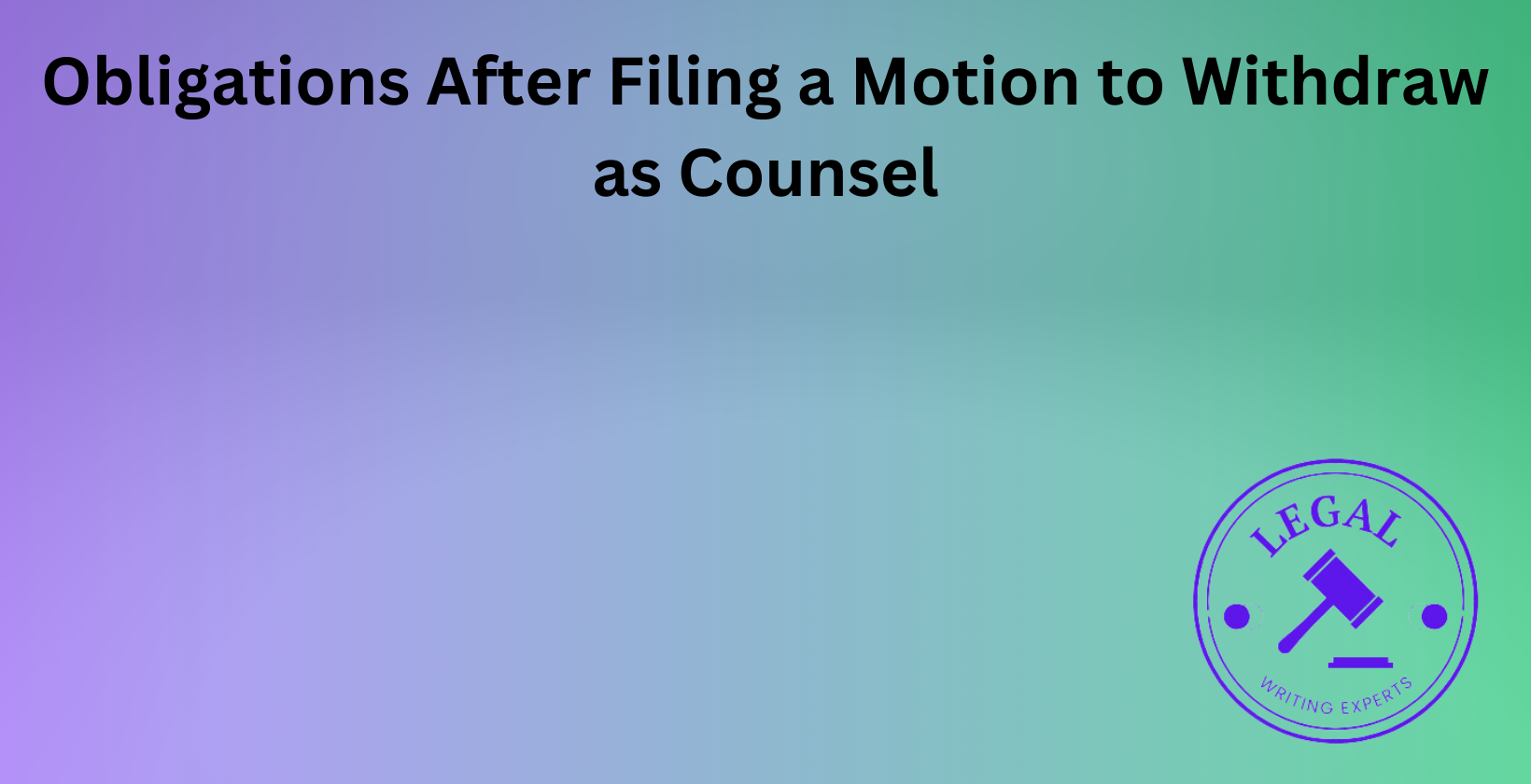Obligations After Filing a Motion to Withdraw as Counsel
Written by
Jessica E
February 27, 2025 · 8 min read

An attorney’s responsibilities do not end after filing a motion to withdraw as counsel. The process requires ensuring that the withdrawal does not prejudice the client’s case and adheres to ethical and professional obligations. Courts have strict rules governing attorney withdrawal, and failing to comply can result in professional discipline. Legal writing services provide guidance on how to draft legal documents for withdrawal motions, ensuring that attorneys meet their legal and ethical duties while disengaging from representation.
What Are the Obligations After Filing a Motion to Withdraw as Counsel?
The obligations after filing a motion to withdraw as counsel include notifying the client, protecting the client’s interests, complying with court rules, and ensuring that the withdrawal does not disrupt ongoing litigation. Attorneys must provide sufficient notice, deliver necessary documents, and assist in the transition to new counsel if applicable. Courts may require attorneys to remain on record until the motion is granted, necessitating continued representation until formal approval is obtained.
How Should an Attorney Notify a Client About Withdrawal?
An attorney must notify a client about withdrawal in writing to ensure clear communication. The notification should outline the reason for withdrawal, upcoming case deadlines, and any required actions the client must take. Sending the notice via certified mail or another verifiable method ensures compliance with legal and ethical standards. Legal document drafting services help attorneys create clear and professional withdrawal notices that meet legal requirements.
What Steps Must Be Taken to Protect a Client’s Interests Upon Withdrawal?
The steps that must be taken to protect a client’s interests upon withdrawal include providing adequate notice, delivering relevant case files, advising on critical deadlines, and assisting in securing new counsel if necessary. Attorneys must avoid causing material harm to the client’s case by ensuring a smooth transition. Courts may require an affidavit confirming that the attorney has fulfilled these duties before approving the withdrawal.
What Are the Ethical Considerations When Withdrawing Due to Nonpayment?
The ethical considerations when withdrawing due to nonpayment include ensuring that the withdrawal does not harm the client’s legal position and that sufficient notice is provided. Attorneys must comply with the rules of professional conduct, which may require them to complete pending matters before withdrawal. Courts may deny withdrawal motions if they find that leaving the client unrepresented would cause undue hardship.
How Can an Attorney Withdraw When a Client Becomes Unresponsive?
An attorney can withdraw when a client becomes unresponsive by documenting attempts to contact the client and notifying the court. Filing a motion to withdraw with evidence of unresponsiveness strengthens the request. Courts typically require attorneys to make reasonable efforts to communicate with clients before allowing withdrawal. Legal document review services near me assist in ensuring that attorneys meet court requirements for withdrawal motions.
What Are the Court Procedures for Attorney Withdrawal in Ongoing Litigation?
The court procedures for attorney withdrawal in ongoing litigation involve filing a formal motion, serving notice to the client and opposing counsel, and obtaining judicial approval. Some courts require a hearing before granting withdrawal, especially in cases where the client lacks new representation. Attorneys must follow jurisdiction-specific rules to ensure compliance with procedural requirements.
How Does Withdrawal Affect Pending Case Deadlines and Hearings?
Withdrawal affects pending case deadlines and hearings by potentially delaying proceedings if the client needs time to secure new counsel. Courts may require attorneys to continue representation until a replacement is found or until critical deadlines pass. Proper legal drafting services help attorneys include necessary details in withdrawal motions to prevent case disruptions.
What Are the Consequences of Failing to Properly Withdraw as Counsel?
The consequences of failing to properly withdraw as counsel include disciplinary action, court sanctions, and malpractice claims. Attorneys who abandon a client without following proper procedures risk violating professional conduct rules. Courts may impose fines or require the attorney to remain on the case if withdrawal is not handled correctly.
How Can an Attorney Ensure Compliance with Professional Conduct Rules During Withdrawal?
An attorney ensures compliance with professional conduct rules during withdrawal by providing reasonable notice, protecting client interests, and following court procedures. Consulting legal research service providers helps attorneys stay updated on ethical and legal requirements. Maintaining documentation of all communication and actions taken further demonstrates adherence to professional standards.
What Is the Process for Substituting New Counsel After Withdrawal?
The process for substituting new counsel after withdrawal involves the client retaining a new attorney, filing a substitution of counsel form, and obtaining court approval. Some jurisdictions require both the withdrawing and incoming attorneys to sign the substitution form. Courts ensure that new counsel is adequately prepared before allowing withdrawal of the original attorney.
How Should an Attorney Handle Client Files and Property Upon Withdrawal?
An attorney should handle client files and property upon withdrawal by securely transferring all case-related documents to the client or new counsel. Legal document writer services assist in drafting file transfer agreements to protect client confidentiality. Attorneys must retain copies of key documents as required by professional rules and return any client property promptly.
What Are the Potential Legal Ramifications for Improper Withdrawal from Representation?
The potential legal ramifications for improper withdrawal from representation include malpractice lawsuits, bar disciplinary actions, and reputational damage. Courts may hold attorneys liable for negligence if their withdrawal negatively impacts a client’s case. Legal research freelance professionals provide insights into past cases where improper withdrawal led to sanctions, helping attorneys avoid similar issues.


